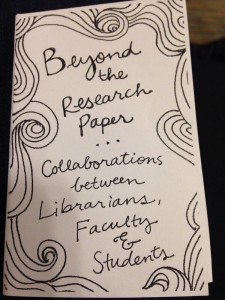Librarians & Archivists in the Land of Women’s and Gender Studies

This weekend, I had the opportunity to participate in the National Women’s Studies Association’s annual conference. Part of what I love about this conference is that I get to learn about projects scholars in women’s and gender studies are doing, as they’re in progress. It’s exciting to hear reports of new analytic approaches as they’re in the making. In one panel I attended, three scholars critiqued representations of Americans of color in different sites — popular media (reality TV), memorializing practices, and internet narratives — for which they’d created methodological and interpretive frames in order to produce works of feminist health science studies and critical race feminist media studies. The conference also offers practical advice for classroom practices: I attended workshops on integrating universal design for learning strategies with feminist teaching practices, and on teaching with e-readers and games.
In addition to providing a space in which scholars can share ideas and work-in-progress, NWSA has a vibrant librarian and archivist contingent. A group of my colleagues offered suggestions for incorporating information literacy and library instruction in women’s and gender studies classes, and, as part of a roundtable session, I discussed ways librarians can support student and faculty beyond the research paper — in their campus & community activism; with digital projects; around campus events, initiatives and conversations, and more. In order to make my presentation more accessible to folks who learn better by reading than by hearing, and to give everyone a fun take-away, I made an informational mini-zine (PDF here). (Not sure how to cut & fold it to make it into a booklet? Here’s how.)
My favorite sessions from the conference involved storytelling. In a session focused on an LGBTQ oral history project in the borderlands area of El Paso/Juarez, we heard stories about methodological challenges, about the ways in which research subjects negotiate their religious and sexual identifications, and how oral histories can provide lived-experience narratives to enrich health disparities data. On Saturday morning, the Disability Studies Interest Group sponsored an “Authors Meet Critics” session, in which scholars gave talks inspired by/in conversation with Alison Kafer’s book Feminist, Queer, Crip. Scholars talked about how Kafer’s work informed their thinking about friendships between scholars, disciplines and fields (Mel Chen), about our futures as givers and receivers of care — almost all of us will experience some impairment in the course of our life (Nirmala Erevelles), and about experiences teaching and negotiating the sometimes-uneasily-aligned politics of reproductive justice & disability rights movements (Sarah Smith Rainey). And, in a plenary session titled “Changing the Subjects: Remaking the Futures of the Feminist Past,” we got to hear Nan Alamilla Boyd talk about the political economy of heritage and identity tourism in San Francisco, and to hear Kelly Wooten‘s thoughts on building feminist archival collections — in both paper and digital form — that reflect a variety of feminists’ lives (famous and not). Alexis Pauline Gumbs concluded the panel with close readings of Audre Lorde’s work, stories from her family history, incantations, poem, encouragement to think otherwise about the academy as the proper location of feminist intellectual work, and a ritual in which everyone in the room was invited to participate: find a thing you carry with you that is part of your personal archive, a link to someone you love, a symbol of freedom. Something you wear on your person, keep in your back pocket, or tucked away in your wallet, or stored in your phone. Show it to the person next to you and tell them its story, a little bit of your story. I can’t imagine that anything better has ever happened in Cincinnati’s Duke Energy Convention Center on a Saturday afternoon.
